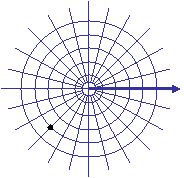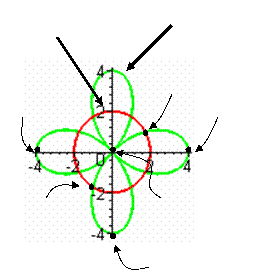 Determine
what type of conic section is given by the equation
Determine
what type of conic section is given by the equation Answers to MAT 162 Test 2 Sample Questions
Conic
1.
 Determine
what type of conic section is given by the equation
Determine
what type of conic section is given by the equation ![]() . Put the equation in standard form and identify the
important relevant information. Sketch the curve on the grid below.
. Put the equation in standard form and identify the
important relevant information. Sketch the curve on the grid below.
Hyperbola
Standard form: ![]()
center: ![]()
vertices: ![]() ,
, ![]()
foci: ![]() ,
, ![]()
Parametric
2.
Below is shown the curve given parametrically by ![]() ,
, ![]() over the parameter interval
over the parameter interval ![]() . Clearly label the initial point, the terminal point, and the
points corresponding to
. Clearly label the initial point, the terminal point, and the
points corresponding to ![]() ,
, ![]() and
and ![]() . Indicate the direction the curve is traced and how many
times the curve is traced (over the interval
. Indicate the direction the curve is traced and how many
times the curve is traced (over the interval ![]() ).
).



3. Find the Cartesian equation for the curve given in Question #2.
![]()
4.
Find the derivative ![]() and the second derivative
and the second derivative ![]() of the curve given in Question #2.
of the curve given in Question #2.
![]()
![]()
5.
Find the (Cartesian) equation of the line tangent to the curve given in
Question #2 at the point corresponding to ![]() .
.
![]()
6. Write the integral to find the length of one tracing of the entire curve given in Question #2. (Note: You do not need to evaluate the integral.)

7. Write the integral to find the area inside the curve and below the x-axis, and evaluate this integral.

8. Write the integral to find the surface area of the solid generated by revolving the region in Question #7 around the x-axis. (Note: You do not need to evaluate the integral.)

9. Write the integral to find the volume of the solid generated by revolving the region in Question #7 around the x-axis. (Note: You do not need to evaluate the integral.)

10.
Plot the point ![]() on the polar grid below. (Label the initial ray, and include
a scale with your plot.) Find two additional representations of this same point,
one with r > 0 and one with r < 0. (Note: angles which reduce to
on the polar grid below. (Label the initial ray, and include
a scale with your plot.) Find two additional representations of this same point,
one with r > 0 and one with r < 0. (Note: angles which reduce to ![]() are not considered to be different from
are not considered to be different from ![]() .)
.)

![]()
Note: there are many others
11.
 Below
is shown the curves given by
Below
is shown the curves given by ![]() and
and ![]() . Identify which curve is which. Plot and label the points
corresponding to
. Identify which curve is which. Plot and label the points
corresponding to ![]() and
and ![]() on the curve given by
on the curve given by ![]() .
.
12.
Find the derivative ![]() of
of ![]() .
.
![]()
13.
Find the (Cartesian) equation of the line tangent to the curve given by
![]() at the point where
at the point where ![]() .
.
![]()
14.
Set up the integral to find
the length of one tracing of ![]() . (Note: You do not need to evaluate the integral.)
. (Note: You do not need to evaluate the integral.)

15.
Set up the integral to find the area of the region inside the curve given
by ![]() and outside the curve given by
and outside the curve given by ![]() . (Note: You do not need to evaluate the integral.)
. (Note: You do not need to evaluate the integral.)

16.
Set up the integral to find the area of the region inside both curves
(where they overlap) ![]() and
and ![]() , and evaluate this integral.
, and evaluate this integral.
